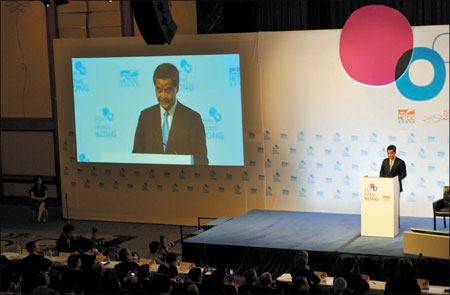HK chief says it is 'a ticket to China'
Updated: 2013-06-12 12:13
By Michael Barris in New York (China Daily)
|
||||||||
|
CY Leung, chief executive OF Hong Kong special administrative region, speaks at the Think Asia, Think Hong Kong conference. Michael Barris / China Daily |
Hong Kong's chief executive, CY Leung, promoted the region at a conference in Manhattan as a "great connector" linking government, business and industry on different levels.
A presence in Hong Kong is "a ticket to China and the Asian markets", Leung said Tuesday.
Judging from the list of prominent senior executives present for the "Think Asia, Think Hong Kong" conference, the region's evolution from a gateway to the Chinese mainland to a national connector was difficult to dispute.
The conference organized by the Hong Kong Trade Development Council sought to promote Hong Kong's advantages as the premier commerce, investment and logistics hub in the Asia-Pacific region as well as an effective springboard for companies to reach the burgeoning regional market. With speeches by 60 or so prominent senior executives from global government, business and industry, it was billed as the largest promotion Hong Kong has ever organized in the US.
Besides exploring Hong Kong's growing role in an increasingly prosperous China, the conference, which will shift to Los Angeles on Friday, provided practical tips to US companies on doing business in China and throughout Asia. The conference also explored the outlook for technology partnerships, yuan-related business opportunities, Chinese outbound investment and the promise of film and digital entertainment collaboration, among other things.
More than 200 Hong Kong and mainland government officials and business leaders participated in the conference at a midtown hotel. Hong Kong services providers from law, accounting, business consultancy and information technology provided on-site advice to participants.
"Hong Kong is situated to profit from China's meteoric rise," Leung told the audience, adding that his government has prioritized enhancing government-to-government, people-to-people and business-to-business links between the region and the mainland in step with the country's increasing prosperity.
Last year, bilateral US-Hong Kong trade reached $69.6 billion, Leung said. Despite the recent global economic crisis, about 1,400 companies operate in the city, "opening up new markets and business opportunities for US firms". Chinese enterprises use Hong Kong's strategic position as an international financial center to launch investments around the world, he said.
As a sign of the region's importance to investors, Hong Kong has served as a testing ground for the internationalization of the yuan (also called the renminbi), hosts the "largest offshore pool" of yuan liquidity and is the primary platform for issuing yuan bonds, Leung said. "Overseas companies, including several US multinationals, have successfully issued RMB-denominated bonds in Hong Kong as relatively low costs to finance their operations and activities" in the Chinese mainland, Leung said.
Leung said the region has been ranked as "the world's freest economy" for each of the past 19 years by the Heritage Foundation, a Washington-based conservative think tank which seeks to promote "conservative public policies based on the principles of free enterprise, limited government, individual freedom, traditional American values, and a strong national defense".
Leung made no reference in his remarks to Edward Snowden, who says he's the source behind reports this week about the US government's secret surveillance programs.
The 29-year-old Snowden fled to Hong Kong on May 20 from Hawaii where he was a contractor for the National Security Agency and the Central Intelligence Agency.
The US has an extradition treaty with Hong Kong, but there are exclusions for political offences, and it's not known if Snowden is still in Hong Kong.
Alex Au, a Hong Kong-based corporate lawyer with the US law firm Winston and Strawn LLP, called the conference timely, amid the United States' and China's increasing economic interdependence.
"We are here to learn how to be of service to them," he said. "We heard what Hong Kong can offer when it comes to doing business between China and US companies."
Xiaofei Liu, an associate with New York-based Knights Investment Group, which specializes in cross-border investment, said the meeting was "what we need".
"Clients always ask me, how do you plan to get the investment out of China?" where capital outflows are tightly regulated, he said. "It's not that hard to do business with China. There are procedures you can follow to make it legal" for capital to leave the country, he said.
michaelbarris@chinadailyusa.com
(China Daily USA 06/12/2013 page2)

 Michelle lays roses at site along Berlin Wall
Michelle lays roses at site along Berlin Wall
 Historic space lecture in Tiangong-1 commences
Historic space lecture in Tiangong-1 commences
 'Sopranos' Star James Gandolfini dead at 51
'Sopranos' Star James Gandolfini dead at 51
 UN: Number of refugees hits 18-year high
UN: Number of refugees hits 18-year high
 Slide: Jet exercises from aircraft carrier
Slide: Jet exercises from aircraft carrier
 Talks establish fishery hotline
Talks establish fishery hotline
 Foreign buyers eye Chinese drones
Foreign buyers eye Chinese drones
 UN chief hails China's peacekeepers
UN chief hails China's peacekeepers
Most Viewed
Editor's Picks

|

|

|

|

|

|
Today's Top News
Shenzhou X astronaut gives lecture today
US told to reassess duties on Chinese paper
Chinese seek greater share of satellite market
Russia rejects Obama's nuke cut proposal
US immigration bill sees Senate breakthrough
Brazilian cities revoke fare hikes
Moody's warns on China's local govt debt
Air quality in major cities drops in May
US Weekly

|

|








